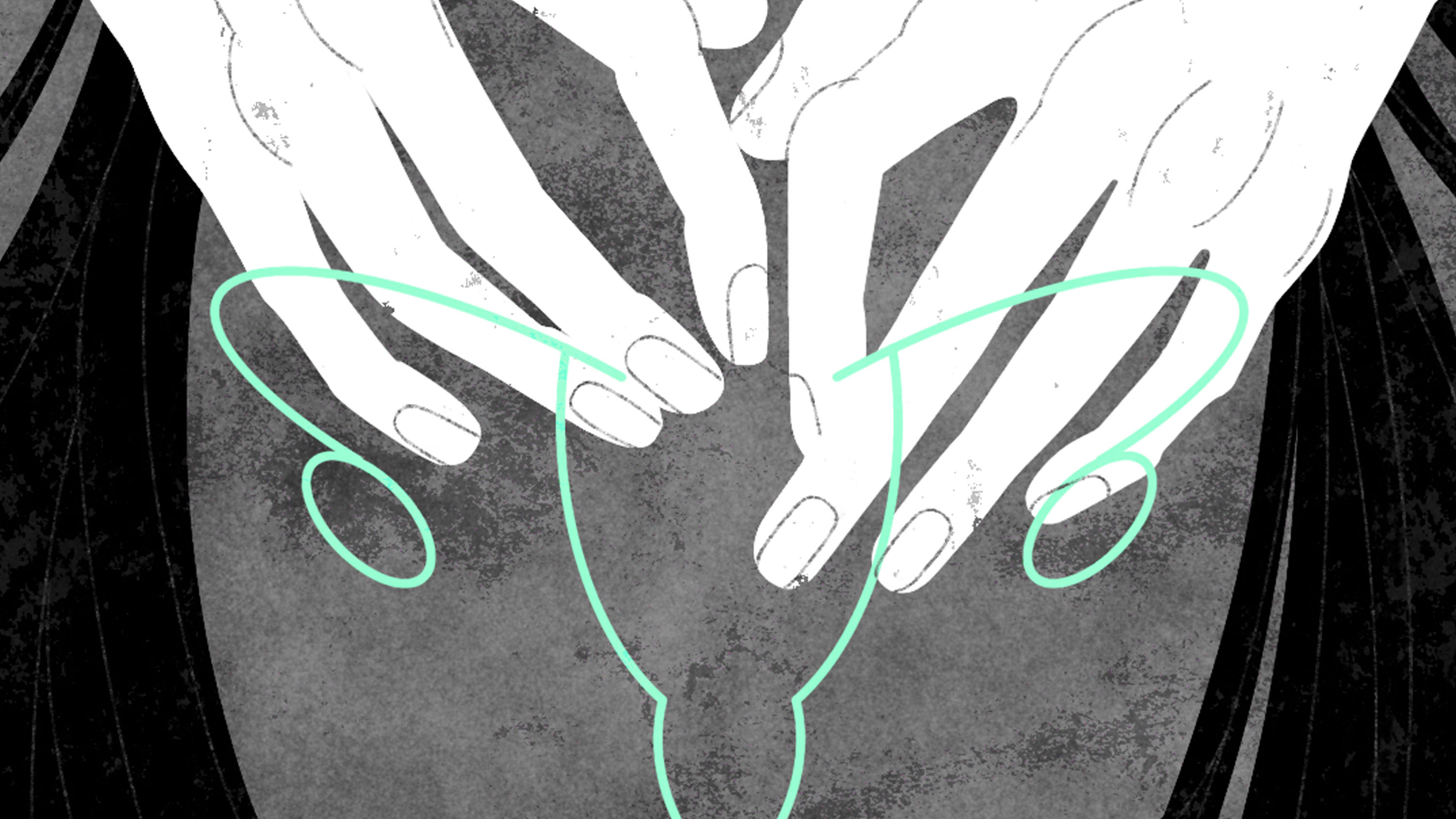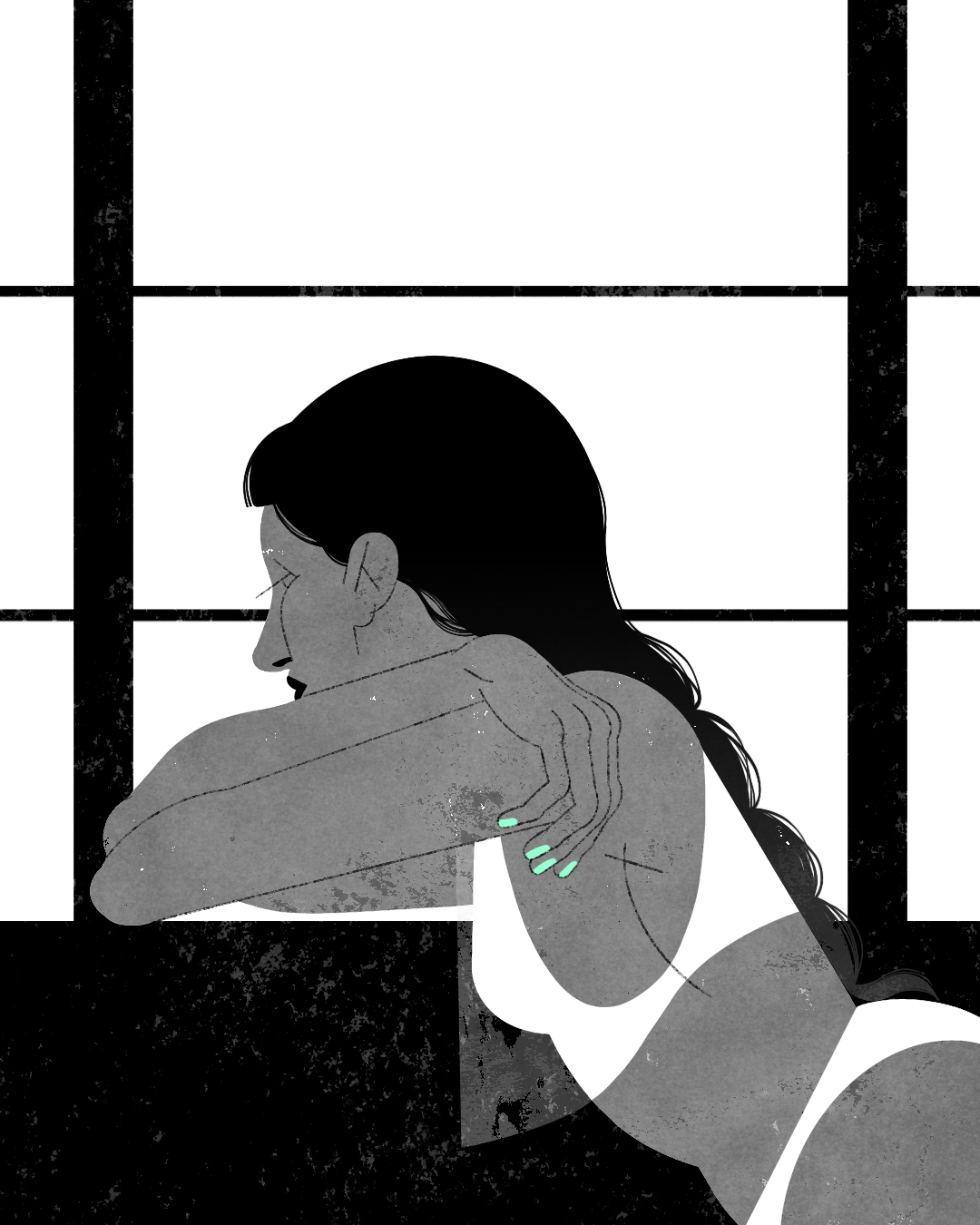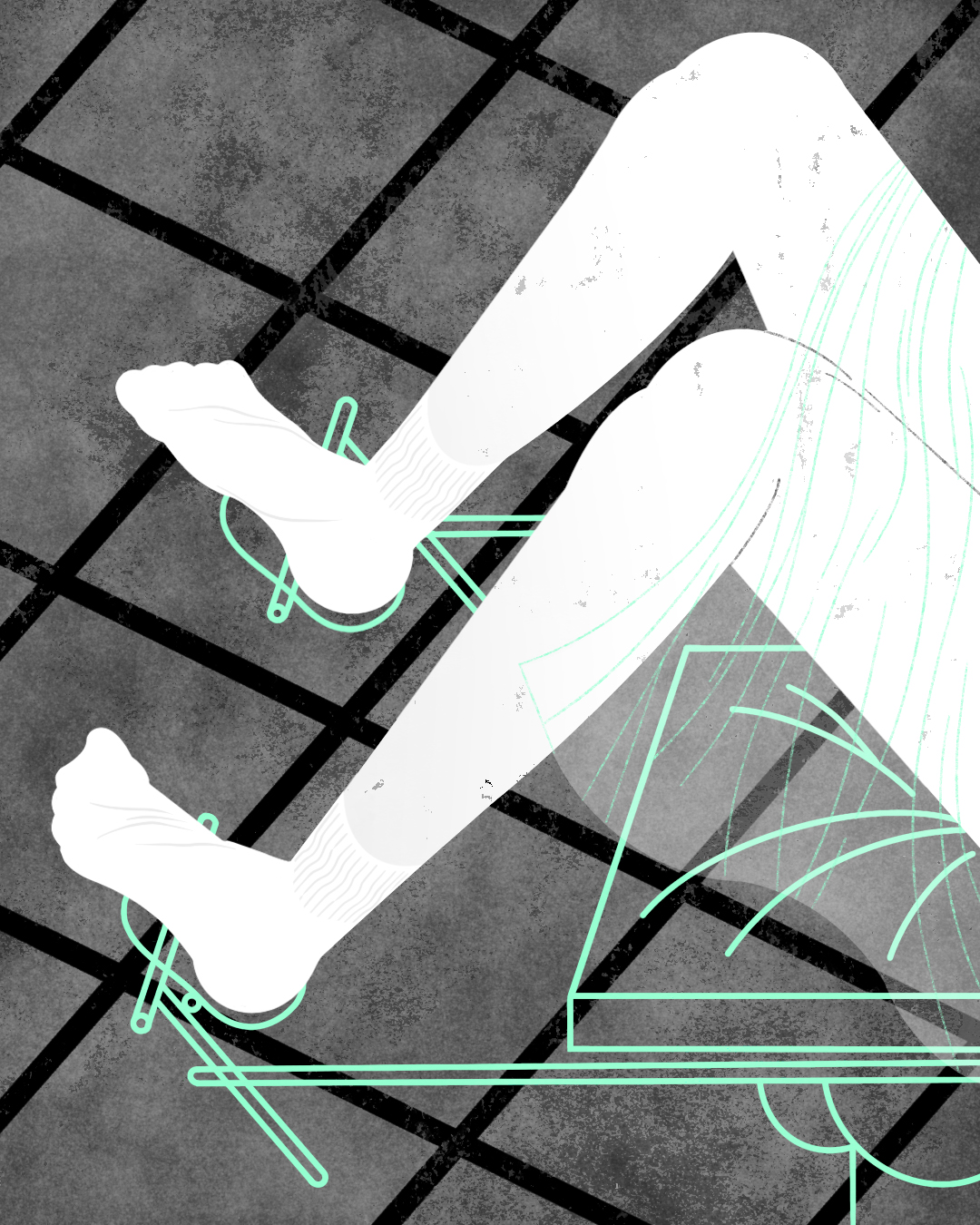The Heaviness of Hysterectomy
Removal of the uterus can have consequences that go far beyond the physical.


The pain began when she was 13. Though Julie Jacques hadn’t even had her first period yet, her cramps were so bad that she was often bedridden, unable to function or even think. Once when she was 14, she fell to the ground in pain. She missed out on a lot. She was mainly home-schooled. When she couldn’t get out of bed, her friends would watch Buffy the Vampire Slayer with her or read to her while she cried in the bath and wondered what was wrong.
Jacques’s doctors finally figured it out when she was 15—she had endometriosis, a disorder that causes cells similar to the uterus or endometrium to grow outside of it and which affects roughly 10 percent of women under age 50. But after attempts to treat the problem with birth control and a period of forced menopause, her doctor made his final recommendation—the removal of her uterus. A hysterectomy. Jacques was just 17.
“I felt like I had nowhere else to turn,” says Jacques, now 31. “I just wanted to be a normal kid going off to college without this pain. I was just like, Okay, get the surgery. Let me get my life back.”
Jacques’ life post-hysterectomy (she later found out that part of her cervix was removed, too) was far from what she expected. Within a year of the surgery, she began experiencing signs of endometriosis again (intense cramps even though she wasn’t menstruating, stabbing lower back pain, and dozens of ovarian cysts, many of which would rupture), which doctors dismissed as impossible, she remembers. Then another troubling symptom began to develop—a dip in her mental health.
“I was down and at my wit’s end. I felt hopeless,” she says. She took medical leave from law school because of her symptoms. “It was a complete mess.”
Not only did removing her uterus not cure her endometriosis, it also led to a life-long struggle with mood issues and chronic pain.
At the time, Jacques didn’t understand the cause of her struggles. Since then, the reality of her situation has crystalized: Not only did removing her uterus not cure her endometriosis, as her doctors promised, it also led to a long list of harmful side effects, including a life-long struggle with mood issues and chronic pain.
Though it may sound extreme, Jacques’s story is not unique. A hysterectomy may be prescribed for symptoms ranging from abnormal uterine bleeding and uterine fibroids to pelvic support problems and gynecological cancer. (Black women are diagnosed with fibroids nearly three times as often as white women, and tend to develop them earlier in their lives; they are more than twice as likely to receive a hysterectomy as their treatment.) Hysterectomy is the second-most common surgical procedure for women in the U.S., after the Cesarean section. More than 400,000 women get hysterectomies every year in the United States, according to an article published in the journal Obstetrics & Gynecology in 2014, and some estimates show that more than one-third of U.S. women will have one by age 60, although the rate that the procedure is performed declined significantly from 1998 to 2010.
Get exclusive access to fashion and beauty trends, hot-off-the-press celebrity news, and more.
It’s important to note that many women who have hysterectomies are happy with their choice and do not report any negative side effects. It’s also important to note that there are some instances when a hysterectomy is life-saving. One is in the event of cancer, either cervical, uterine, or ovarian. Another extremely viable reason for hysterectomy is as part of gender confirmation for transgender men.
Still, the vast majority of hysterectomies are performed for benign conditions. A 2015 study found that nearly one in five women who undergo hysterectomy may not need the procedure. The rate of unsupportive pathology post-surgery was especially high in women under 40, nearly 2 in 5 women. The study found that nearly 40 percent of women were not offered alternative treatments for a benign condition prior to surgery.
The question of necessity becomes particularly important when considering that a total hysterectomy will result not only in early menopause and the inability to carry a biological child in the future, but also, as women like Jacques have reported, mental and emotional side effects. Women we spoke to say their doctors dismissed their distressing post-surgery symptoms with a patronizing “it’s all in your head.”
“I wasn't asking for the hysterectomy,” says Jacques. “It was very much pushed on me.”
In Ancient Greece, it was thought that the hystera, or womb, wandered throughout the body causing mental and physical problems. In the 18th and 19th centuries, female hysteria was a disorder diagnosed mainly in women—a Canadian psychiatrist even advocated surgically removing the womb to cure women of mental illness. Smelling salts used by Victorian women presumably snapped that errant womb back into place. In the 1968 Diagnostic and Statistical Manual of Mental Disorders or DSM-II, hysteria was listed as a mental health condition, only dropping from the DSM-III in 1980. In summary, wombs have long equaled a propensity for neuroses.
It’s not an entirely preposterous assessment. The connection between hysterectomy and mental health issues is clear: According to Mayo Clinic research, women are at greater long-term risk for anxiety and depression following a hysterectomy; if they underwent the procedure between the ages of 18 and 35, that risk nearly doubles. Hysterectomy patients also have an increased risk for bipolar disorder; endometriosis and hormone therapy may add to the risk of bipolar disorder after the procedure.
While the term hysterectomy technically refers to the removal of the uterus, the procedure sometimes includes the ovaries, fallopian tubes, and/or cervix. In fact, 300,000 women in the U.S. have their healthy ovaries removed every year. But even when the ovaries are kept intact, a hysterectomy can cause them to eventually stop functioning. One study found that 25 percent of women lose ovarian function by six months post-hysterectomy. According to Dr. Philip Sarrel, professor emeritus of Obstetrics, Gynecology, Reproductive Sciences, and Psychiatry at Yale School of Medicine, and president and founder of the Advancing Health After Hysterectomy Foundation, this could be due in part to the loss of the shared blood supply between the organs.

There’s likely one major cause for this mind-uterus connection: hormones, or the lack thereof. Research into the function of female hormones beyond their role in fertility is severely lacking, but we do know that when a woman’s ovaries stop producing estrogen (a potential result of a hysterectomy), she can experience a bevy of negative side effects. One paper published in Menopause Review in 2018, for example, connects estrogen deficiency with depression, psychological tension, anxiety, mood swings, loss of libido, and decreased self-esteem.
Some of these issues (plus memory loss and brain fog) occur with the natural lessening of estrogen due to menopause, which typically happens gradually and naturally around age 50. But when a woman goes into early or forced menopause, the likelihood of these symptoms occurring rises. For women still in child-bearing years, a hysterectomy can be a form of forced menopause.
The connection between estrogen and mental health isn’t well understood. But we do know that the ovaries form a connection to our brains as part of the hypothalamic–pituitary–gonadal axis (HPG axis), a major signaling pathway that regulates the reproductive system. Even after menopause, this system makes hormones that keep women healthy for their entire lives. If the ovaries are removed entirely, those hormones are no longer being produced.
Some experts also speculate that ovarian hormones modulate the serotonin system, and therefore mood. But the mechanism of that relationship has yet to be discovered. Dr. Sarrel thinks that the impact of a hysterectomy on mental wellness also has to do with the actions of estrogen on nerve transmission, as well as blood flow to the brain. He cites a growing body of research (including his own) that points to hot flashes having something to do with post-hysterectomy depression.
But even without a perfect understanding of why, Dr. Sarrel concludes simply: “Estrogen plays an essential role in biological existence. And it has for 600 million years.”
Unfortunately, too many women are being treated with a hysterectomy for endometriosis, but it doesn't make sense. Their pain is outside of the uterus.
In Jacques’ initial surgery her doctor did preserve her ovaries. But not long after, she had to have one of them removed because it was covered with endometriosis. Her new doctor says the remaining ovary “isn’t that healthy-looking,” but has advised her to leave it in order to keep her hormone levels as steady as possible—and therefore her mental health.
Alternatives to hysterectomy for non-life-threatening disorders include laparoscopic procedures, medication, and a hormonal intrauterine device (IUD). OB-GYN Iris Kerin Orbuch, M.D., author of Beating Endo: How to Reclaim Your Life from Endometriosis, believes that too many doctors jump to performing a hysterectomy when they encounter a patient who is having pelvic pain. “You can’t be knife-happy,” she says. Dr. Orbuch describes patients who had a hysterectomy at 17 or in their 20s, who come into her office, “in tears because they're like, ‘My doctor said my pain was going to get better. I always wanted a kid. I'm still in pain…and my dreams are shattered.’ They never should have had a hysterectomy in the first place.”
She advocates for treating underlying issues causing the pain before turning to surgery. Skipping right to a hysterectomy, she says, doesn’t handle other causes for pain, like tight pelvic floor muscles. “And now, you've shattered their childbearing dreams,” she adds. “It's devastating; you can’t just glue a uterus back in.”
With endometriosis, cells that are similar to the uterus lining or the endometrium are found outside the uterus, explains Dr. Orbuch. The inflammatory changes caused by these cells can alter the structure of the pelvis, pulling things to the left or right or the back. “Unfortunately, too many women are being treated with a hysterectomy for endometriosis, but it doesn't make sense. Their pain is outside of the uterus.”
A hysterectomy is, however, the definitive treatment for adenomyosis. It is “a cousin of endometriosis,” she says. “Adenomyosis is when you have those cells that are similar to the lining of the uterus or endometrial-like cells, but they're found within the smooth muscle of the uterus. So their location is in the uterus. Women with adenomyosis can have heavy bleeding. They tend to have a low sacral backache. They tend to have midline pelvic pain, a heaviness in their pelvis.” Many women have both endometriosis and adenomyosis, “not always, but very often,” she says, “so it gets a bit complicated.”
When surgery is the best option, Dr. Orbuch discusses all eventualities, including, if the patient still has ovaries, using their eggs and a surrogate. “I spell that out to them. I spell out that it may not help their pain, we don't know. I spell out that they could develop scarring or lesions, which may cause more pain. So any surgery theoretically can beget more pain.”
Jenneh Rishe was 30 when she had her hysterectomy. She was in a serious relationship but not married, and the couple wasn’t sure about wanting kids. Her symptoms included pain with sexual penetration and constant pain in her back, hips, and groin; during a pelvic exam she “was jumping off the table” every time the doctor touched her uterus. Rishe had been diagnosed with endometriosis and later adenomyosis. “I didn't know what specifically was causing what. The surgeon asked if, when he was doing the endometriosis surgery, if he needed to, [could he] take [my] uterus?”
Faced with a decision about her “forever fertility,” she didn't feel prepared to make such a permanent choice. “So I told my surgeon that if, when he's in there, he's very suspicious of adenomyosis, he [could] do a different procedure, which is called a presacral neurectomy. Basically he would sever the nerves that send pain signals to my uterus. So I wouldn't feel pain. So that's what we did.” That gave her relief for about six months. Over time, she started “feeling bad again,” she says, with terrible back pain and “pelvic spasms that would bring me to my knees.” She had brain fog and was tired all the time. She tried everything she could to avoid having a hysterectomy—an IUD, steroid injections, physical therapy. “You name it, I tried it. I really did give everything a shot before deciding to move forward with the hysterectomy,” says Rishe. Ultimately, it was about her quality of life. “I was functional enough to go to work and barely manage through my day. I was taking every kind of THC and CBD [I] could. I'd have, underneath my clothes, a heating pad and a lidocaine patch. That was my every single day.”
I think that's what I wrestled with even more so than my own decision: that society made me feel like I wasn't good enough.
She and her boyfriend sat down and asked themselves, “‘Just what is the point of all this?’ We both didn't know if we wanted kids. We weren't married or engaged or anything. And so I had to make this decision for myself, but also for somebody else, essentially.” Her dilemma after a year of trying to manage: Hold out for something she’s not even sure she wants and “stay miserable” or have the hysterectomy?
In 2017, she decided on the latter. “And, of course, I felt a lot better,” she says. “As I expected to, physically, I felt amazing.” She was, however, unprepared for the wave of grief that hit her at about three months post-surgery. “I'm a nurse; I'm very calculated in my medical decisions. I weigh all the risks and benefits. I went in very, very confident in my decision and I still am. But I think that rational side of me didn't leave room for any emotions that were going to come with it,” she says. “It just hit me like, Oh my gosh, like I can never carry a child of my own.” One of her closest friends was having a baby shower and Rishe, who by this point had gotten engaged to her boyfriend, couldn’t attend. “I was going in circles.”
Rishe, author of Part of You, Not All of You: Shared Wisdom and Guided Journaling for Life With Chronic Illness, was disturbed by society’s narrative that women’s utmost joy and fulfillment is through raising a child. “I'm probably hyper-focused on it, but I feel like it is everywhere,” she says. “I can't escape this idea that motherhood is the be-all, end-all of accomplishment for women. I think that's what I wrestled with even more so than my own decision: that society made me feel like I wasn't good enough.”

On top of this feeling of existential loss, Rishe went into early menopause. “That was a whole other nightmare,” she says. Since the operation did not remove her ovaries, “the idea was that I would not have any hormonal issues, but that's not the case. [My hormones] were a mess. They were so inconsistent.” Her doctor had not prepared her for this possibility. “I tried every type of hormone replacement under the sun, every patch, every cream, every insert and nothing works…I have talked to a lot of women who have had hormone issues, post-hysterectomy, but are told because they have their ovaries that shouldn't be the case. But it is for a lot of us.” She also has hot flashes, vaginal dryness, insomnia, and anxiety. “I never had any of that before the surgery, ever.”
Rishe has seen at least five hormone specialists some of whom, she says, admitted that they’re not used to seeing younger patients; they're not used to seeing a 30-something having perimenopausal-type symptoms with ovaries. “No one really knew what to do with me. I had a really hard time with that.”
If they are done having children, or don’t want them at all, hysterectomy patients may be told that their sex organs serve no purpose, and they might as well have them taken out. Even the American Cancer Society says that treatment for cervical cancer “depends on whether or not you want to be able to have children.” If you don’t, the plan for care is a hysterectomy, plain and simple.
This line of thinking is sometimes continued when women approach their doctors with post-hysterectomy depression, or other psychological side effects. Anecdotally, women report doctors brushing off their symptoms and chalking it up to mourning their lost fertility. “I cannot tell you how many women who were depressed after hysterectomy with their ovaries retained who were told, ‘You're mourning the loss of your uterus,’” Dr. Sarrel says. “Women with depression really have a hard time being believed or being listened to.”
The impact of a hysterectomy on one’s fertility and sexuality is the subject of a new movie from Lena Dunham—her first feature film in a dozen years. Released just last month, Sharp Stick tells the story of a young nanny who comes off as frumpy and sexually naive due to having had a hysterectomy as a teen. After a fling with her charge's dad, the lead character embarks on a cinematic journey of sexual awakening. (A hysterectomy can result in loss of sexual response and desire, particularly if the cervix was removed, however, some women report an increase in sexual satisfaction after the surgery, perhaps as a result of reduction in pain during sex.)
I don't think we realize how much the uterus has to do with who we are. How you walk, how you talk, how you dance.
Dunham herself had a hysterectomy at 31, after a decade of battling endometriosis and several other surgeries. A known confessional storyteller, Dunham shared deep thoughts about her own infertility, surgery, and pain in an article she wrote for Vogue in 2018, "...something is wrong with my uterus. I can feel it, deeply specific yet unverified, despite so many tests and so much medical dialogue. I just sense that the uterus I have been given is defective." Dunham has openly mourned the fact that she’ll never physically carry a baby, saying she misses the pregnant belly she wore on Girls and the one she constructed as a child out of bunched up laundry. She talks about the "big stupid sobs" she cries over her lost uterus when she's alone in the bathtub.
While Dr. Orbuch allows that most OB-GYNs are women’s health generalists and not specialists in, say, endocrinology or endometriosis as she is, which could contribute to the deficit in communication, one anti-hysterectomy activist, Nora W. Coffey, believes that doctors are deliberately not telling patients about the connection between sexual organs and mental health. “It's not that doctors don't know what they're doing. They know exactly what they're doing to women. They studied anatomy,” she says. “I’ve come to the conclusion that it's deliberate. They do not want the truth out.”
Coffey is the founder of the HERS Foundation, a nonprofit organization that has been educating women about female anatomy and the after-effects of hysterectomy since 1982. The impetus for HERS was Coffey’s own experience with the detrimental changes caused by her hysterectomy, which she underwent in her mid-thirties. Since then, she’s spent nearly 40 years trying to get medical school faculty to listen to her and to change their actions, to almost no avail. She’s also spent that time collecting stories from thousands of women with experiences like hers—and getting this information into the hands of as many women as possible.
To Coffey, there is absolutely no question about hysterectomy’s devastating effects on women’s psychological and emotional health. In addition to a long list of other side effects, data compiled by HERS through surveys and interviews has found that nearly 80 percent of women who had a hysterectomy with both ovaries removed have experienced a change of personality, 70 percent have lost the ability to socialize, 54 percent have experienced suicidal thoughts, and nearly 10 percent have made suicide attempts. HERS even has one woman’s suicide letter, which details her post-hysterectomy decline, posted on their website.
“I don't think we realize how much the uterus has to do with who we are. How you walk, how you talk, how you dance,” says Coffey. “Every part of your body is affected, your brain. Everything.”
Whether research can prove exactly what that ineffable connection between the uterus and the mind is or not, Coffey says, the organ shouldn’t be cut out without a woman being fully informed about the potential consequences. In fact, she believes that one reason women become depressed after hysterectomy is that they’re not adequately prepared for what to expect.
Jacques feels the same. Since her hysterectomy, she’s had three surgeries—the first two to mitigate the damage done by that initial procedure, and the last to finally rid her body of the endometriosis the hysterectomy was supposed to cure. While she knows now that her hysterectomy was unnecessary, she says she just wishes her doctor had told her something—anything—about what to expect.
“I would have liked them to prep me a little bit,” she says. “My hormones were just beginning at that stage, so I would have liked more information about what could potentially happen, and if this would cause a hormone imbalance. Because it definitely did.”
Like Coffey, Jacques is using her experience to help others—she is currently a patient advocate for women and especially teenagers who may be pushed into a surgery they don’t need. Or, as Coffey puts it, give them the information to make that decision for themselves, whether “need” is part of the conversation or not.
“If you have a condition that you might die from and a hysterectomy would save your life,” Coffey says, “you still have the right to know the consequences and decide what you're going to do.”
Additional reporting by Tessa Love

Maria Ricapito is a writer who lives in the Hudson Valley.
